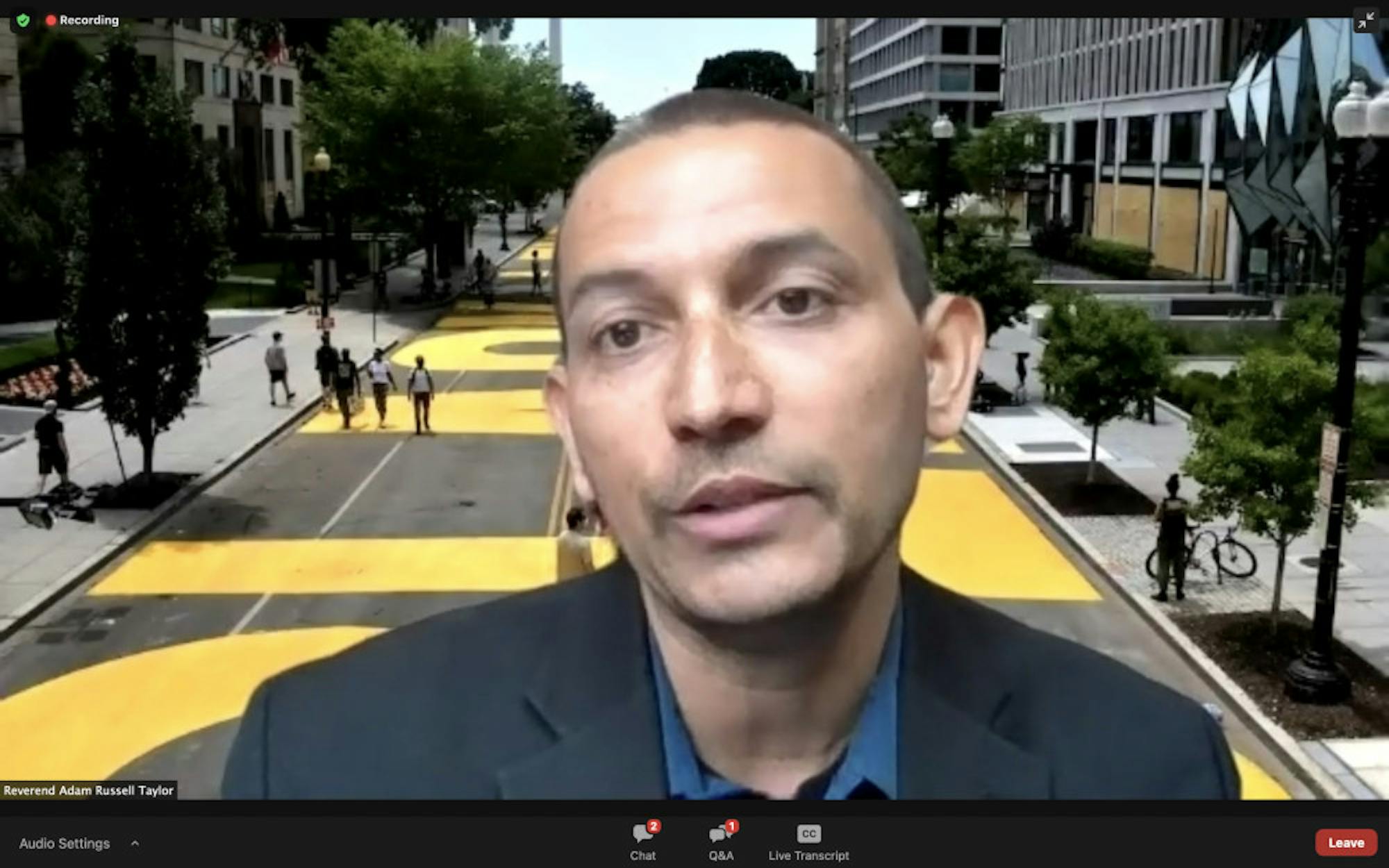The Tufts University Chaplaincy hosted its annual James A. Russell Lectureship on Spiritual Life on April 7, titled “The Work Ahead: Building a Just, Beloved Community.” The lecture featured the Rev. Adam Russell Taylor, the current president ofSojourners, a nonprofit organization committed to "faith in action for social justice."
University President Anthony Monaco spoke, with University Chaplain Elyse Nelson Winger then welcoming and introducing the Rev. Taylor. She explained why she invited him to speak.
"I was reading Sojourners Magazine and following Rev. Taylor's columns replete with faithful calls for justice for Breonna Taylor and George Floyd, for voting rights, for faith communities, pastoral and prophetic civic engagement in our society, and I thought, if we could invite Rev. Taylor to speak for this lecture in this moment, we would be fortunate indeed," Nelson Winger said.
Taylor, a Baptist minister, began by extending his lecture on community building to those outside of the Christian community.
“The process of building the beloved community is one that involves and includes everyone. People of every faith or no faith at all,” Taylor said. “All of us are vital to this conversation and project, and so I really welcome everyone in.”
He then reflected on the life and work of Dr. Martin Luther King Jr., emphasizing his commitment to building a community rooted in faith and love and commenting on how to utilize that lesson in current times.
“Dr. King and so many other Civil Rights leaders understood that faith combined with civic activism can literally be the spark plug, the catalyst for building social movements that can literally transform our nation," Taylor said.
Taylor highlighted the importance of not conforming to a world that harms marginalized people. He also pointed out that inequity has only increased since the pandemic.
“[Nonconformance] is desperately needed in the times in which we live today, when we are confronted with the dual pandemics of COVID-19 and a much longer standing pandemic of systemic racism that has haunted our country from its very inception,” Taylor said. “I believe that Dr. King pushes us to understand that part and parcel to spirituality and faith is a commitment to activism, a commitment to help make the world and our nation and our communities a better place and a commitment to address many of the root causes of injustice that so often perpetuate harm and perpetuate oppression and injustice in first place.”
He expanded further on this.
“We have an opportunity, I would even say a responsibility, to come out of this crisis and … build a nation in which we finally cast out the belief that some lives are worth more than others, and that some Americans are more American than others, where we embrace a much more inclusive 'we the people' and make the American creative liberty and justice for all truly a reality for all Americans," Taylor said.
Taylor acknowledged that there is not a single cure for the harm caused by COVID-19 and systemic racism, but still emphasized the need for persistence in addressing these issues through faith.
“I believe that our faith traditions provide timeless wisdom that can and must be used to combat and even cure these viruses, that a shared moral vision for our country can be one of the most powerful antidotes,” Taylor said.
He continued to stress that building a more beloved community is not inevitable, and that it will take work to achieve.
“It will require all of us to engage in this work together to combat the viruses of systemic racism and toxic polarization which represent both an imperative and a test of our faith in our spirituality,” Taylor said. “We will see an end to this COVID crisis, but let's do it in a way that remakes and transform Boston and our nation and the places in which liberty and justice for all are not simply an aspirational ideal, but become a reality for all.”
Taylor ended his lecture with a call to action.
“So Tufts students and alumni and friends … Now is the time to replace a broken and bankrupt moral vision with a more hopeful and unifying one. Now is the time to build the beloved community,” Taylor said.
The event turned to student questions before Humanist Chaplain Walker Bristol wrapped up the event with their closing remarks, emphasizing the use of history and its place in building community today.
“I invite us all to keep history alive among us, the history that lives within us and around us, celebrating the histories of resilience and transformation, but also telling the truth about the storied histories of violence, of slavery that are beneath so much of what we've created in this nation in particular,” Bristol said. “We have an extraordinary opportunity through coming into a relationship and into a deeper and beloved community, to give those stories the life they deserve and to make healing possible.”






